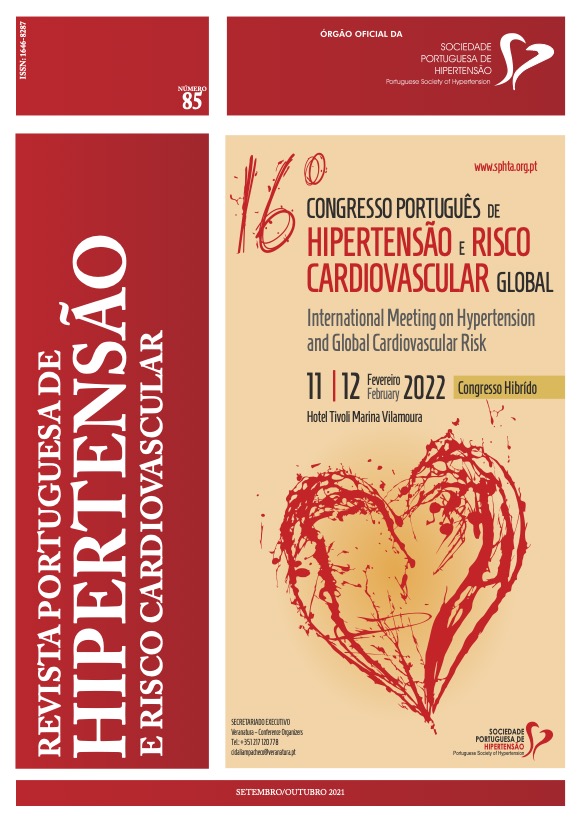HYPERTENSION OF DIFFICULT CONTROL – A PSEUDO-RESISTANT HYPERTENSION CASE REPORT
DOI:
https://doi.org/10.58043/rphrc.21Abstract
Introduction: Cardio and cerebrovascular diseases continue to be the leading cause of death worldwide, for which there are several risk factors, with arterial hypertension being the most prevalent. In 5-10% of cases of hypertension, there is a secondary cause, with situations that should lead to its suspicion such as young age or resistant hypertension. This corresponds to an uncontrolled hypertension despite being medicated, which must be approached with care and investigated.
Clinical Case: A 44-year-old woman, with no relevant history, developed a new case of hypertension with multiple visits to the Emergency Department due to hypertensive crisis in late 2016. From the evaluation by her attending physician, it was found a case of difficult to control hypertension and the study for secondary causes was negative. She was correctly medicated, but after 6 months, with several adjustments in medication, she always had high blood pressure (BP) values, and was assumed as a case of resistant hypertension. In one of the reassessment appointments, after exploring the situation, the existence of depression and anxiety with poor adherence to treatment was found. It was decided to medicate and intercede in adherence to therapy and over time there was a stabilization of BP values.
Discussion: This case demonstrates a situation of pseudo-resistant hypertension in a complex patient. There are several factors that can influence BP control, from therapeutic adherence to external factors that affect the lives of patients, such as work and family problems, anxiety and depression, elements that may have been the cause of the difficult control of hypertension. The comprehensive and individual approach to each situation, as well as the doctor-patient relationship, has a fundamental role in the control of each chronic disease.
Downloads
References
Rodrigues, A, et al. Prevalência de hipertensão arterial em Portugal: resultados do Primeiro Inquérito Nacional com Exame Físico (INSEF 2015). Instituto Nacional de Saúde Doutor Ricardo Jorge. 2015;
Wilson P. Overview of established risk factors for cardiovascular disease. Retrieved from UpToDate (http://www.uptodate.com). Last Review: Sep 2020;
Battistoni A, et al. Hypertension in Young People: Epidemiology, Diagnostic Assessment and Therapeutic Approach. High Blood Press Cardiovasc Prev 2015 Dec;22(4):381-8;
Williams B et al. 2018 ESC/ESH Guidelines for the management of arterial hypertension. European Heart Journal. 2018;39(33):3021- 3104;
Charles L et al. Secondary Hypertension: Discovering the Underlying Cause. Am Fam Physician. 2017 Oct 1;96(7):453-461;
Textor, S. Evaluation of secondary hypertension. Retrieved from UpToDate (http://www.uptodate.com). Last Review: Sep 2020;
Myat A, Redwood S, Qureshi A, Spertus J and Williams B. Resistant hypertension. BMJ. 2012; 345:7473-e7473;
Townsend, R. Definition, risk factors, and evaluation of resistant hypertension. Retrieved from UpToDate (http://www.uptodate. com). Last Review: Sep 2020;
American Board of Internal Medicine: ABIM Laboratory Test Reference Ranges - January 2020;
Kearney P. et al. Worldwide prevalence of hypertension: a systematic review. J Hypertens 2004; 22: 1.19-1;
Jung O, Gechter J, Wunder C, Paulke A, Bartel C, Geiger H et al. Resistant hypertension? Assessment of adherence by toxicological urine analysis. Journal of Hypertension. 2013;31(4):766-774;
Vrijens B, Antoniou S, Burnier M, de la Sierra A, Volpe M. Current Situation of Medication Adherence in Hypertension. Frontiers in Pharmacology. 2017; 8;
Krousel-Wood M, Frohlich E. Hypertension and Depression: Coexisting Barriers to Medication Adherence. The Journal of Clinical Hypertension. 2010;
Wing R,Phelan S,Tate D.The role of adherence in mediating the relationship between depression and health outcomes. J Psychosom Res 2002;53:877–881;
Rutledge T, Hogan BE. A quantitative review of prospective evidence linking psychological factors with hypertension development. Psychosom Med. 2002;64:758-766;
Jonas BS, Franks P, Ingram DD. Are symptoms of anxiety and depression risk factors for hypertension? Longitudinal evidence from the National Health and Nutrition Examination Survey I Epidemiologic Follow-up Study. Arch Fam Med. 1997;6:43e49





